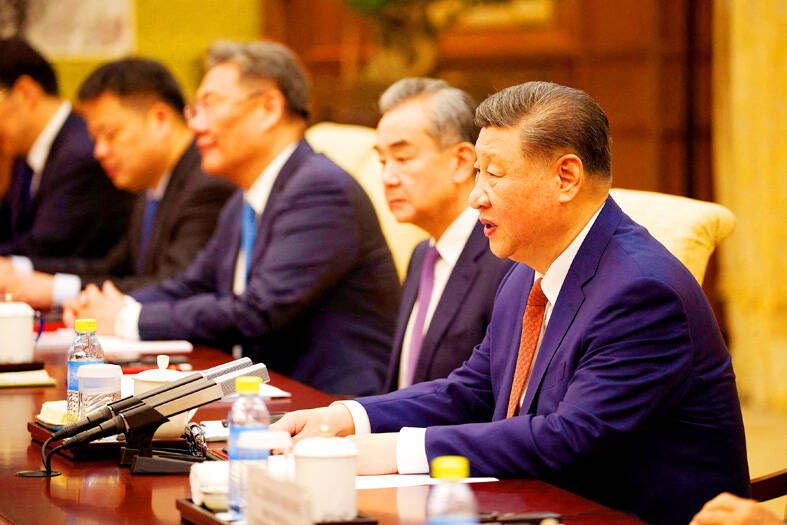Chinese President Xi Jinping (習近平) has called for the building of strong border, sea and air defenses to protect the country’s territorial sovereignty and maritime interests, China’s state-run Xinhua news agency reported yesterday.
Border, sea and air defense is an important symbol of China’s sovereignty, and a key guarantee for the country’s development, Xinhua cited Xi as saying on Tuesday at a so-called collective study session of the Chinese Communist Party’s politburo.
Such collective study sessions, often conducted a month or two apart, offer clues to the thinking and priorities of China’s top political leadership.

Photo: Reuters
A few days after a study session in July last year, Xi appointed a new head of the armed force overseeing China’s conventional and nuclear missiles. The appointment by Xi came on the eve of the 96th anniversary of the founding of the Chinese People’s Liberation Army (PLA) on Aug. 1.
The June study session focused on party governance and corruption. Last month, the party removed former Chinese minister of national defense Li Shangfu (李尚福) and former PLA Rocket Force commander Li Yuchao (李玉超) from the party for corruption.
“We must coordinate the promotion of border, sea and air defense construction and the economic and social development of border and coastal areas,” Xinhua cited Xi as saying at Tuesday’s study session, ahead of the 97th PLA anniversary.
China must also be more empowered technologically, and must build “new means and conditions” as it strengthens its border, sea and air defenses, he said.
The Chinese government increased its this year’s defense budget by 7.2 percent, in line with the rate in last year’s budget and again well above the Chinese government’s annual economic growth forecast.
Tensions have risen in the past few years over Taiwan and elsewhere in East Asia, particularly in the South China Sea where Beijing and Manila have increasingly clashed over maritime claims.
The US pledged funding of US$500 million on Tuesday for the Philippines’ military and coast guard in a show of support for Manila as it faces Chinese actions in the South China Sea.

‘CHARM OFFENSIVE’: Beijing has been sending senior Chinese officials to Okinawa as part of efforts to influence public opinion against the US, the ‘Telegraph’ reported Beijing is believed to be sowing divisions in Japan’s Okinawa Prefecture to better facilitate an invasion of Taiwan, British newspaper the Telegraph reported on Saturday. Less than 750km from Taiwan, Okinawa hosts nearly 30,000 US troops who would likely “play a pivotal role should Beijing order the invasion of Taiwan,” it wrote. To prevent US intervention in an invasion, China is carrying out a “silent invasion” of Okinawa by stoking the flames of discontent among locals toward the US presence in the prefecture, it said. Beijing is also allegedly funding separatists in the region, including Chosuke Yara, the head of the Ryukyu Independence

UNITED: The premier said Trump’s tariff comments provided a great opportunity for the private and public sectors to come together to maintain the nation’s chip advantage The government is considering ways to assist the nation’s semiconductor industry or hosting collaborative projects with the private sector after US President Donald Trump threatened to impose a 100 percent tariff on chips exported to the US, Premier Cho Jung-tai (卓榮泰) said yesterday. Trump on Monday told Republican members of the US Congress about plans to impose sweeping tariffs on semiconductors, steel, aluminum, copper and pharmaceuticals “in the very near future.” “It’s time for the United States to return to the system that made us richer and more powerful than ever before,” Trump said at the Republican Issues Conference in Miami, Florida. “They

GOLDEN OPPORTUNITY: Taiwan must capitalize on the shock waves DeepSeek has sent through US markets to show it is a tech partner of Washington, a researcher said China’s reported breakthrough in artificial intelligence (AI) would prompt the US to seek a stronger alliance with Taiwan and Japan to secure its technological superiority, a Taiwanese researcher said yesterday. The launch of low-cost AI model DeepSeek (深度求索) on Monday sent US tech stocks tumbling, with chipmaker Nvidia Corp losing 16 percent of its value and the NASDAQ falling 612.46 points, or 3.07 percent, to close at 19,341.84 points. On the same day, the Philadelphia Stock Exchange Semiconductor Sector index dropped 488.7 points, or 9.15 percent, to close at 4,853.24 points. The launch of the Chinese chatbot proves that a competitor can

‘VERY SHALLOW’: The center of Saturday’s quake in Tainan’s Dongshan District hit at a depth of 7.7km, while yesterday’s in Nansai was at a depth of 8.1km, the CWA said Two magnitude 5.7 earthquakes that struck on Saturday night and yesterday morning were aftershocks triggered by a magnitude 6.4 quake on Tuesday last week, a seismologist said, adding that the epicenters of the aftershocks are moving westward. Saturday and yesterday’s earthquakes occurred as people were preparing for the Lunar New Year holiday this week. As of 10am yesterday, the Central Weather Administration (CWA) recorded 110 aftershocks from last week’s main earthquake, including six magnitude 5 to 6 quakes and 32 magnitude 4 to 5 tremors. Seventy-one of the earthquakes were smaller than magnitude 4. Thirty-one of the aftershocks were felt nationwide, while 79